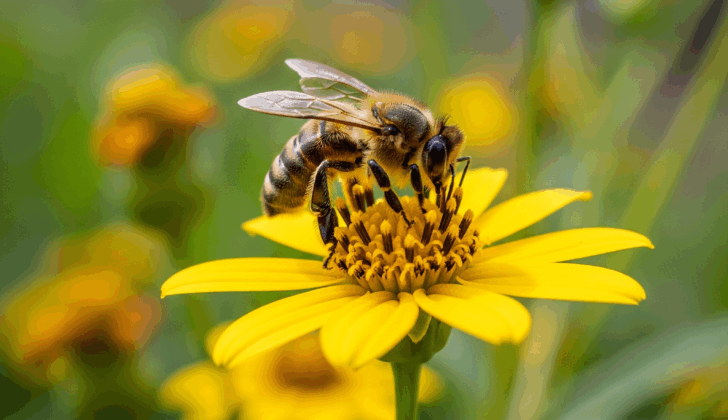Bee Pollen: Nature’s Superfood with Surprising Health Benefits
Bee pollen has been called one of nature’s most complete foods. Tiny but powerful, these golden granules are packed with vitamins, minerals, proteins, and antioxidants. For centuries, bee pollen has been used in traditional medicine and healing practices, and today, it’s gaining popularity as a functional food—a food that provides health benefits beyond basic nutrition.
In this article, we’ll explore what bee pollen is, the science-backed health benefits it may offer, how to use it, and precautions to keep in mind.
What Is Bee Pollen?
Bee pollen is a mixture of flower pollen, nectar, enzymes, honey, wax, and bee secretions. When bees collect pollen from flowers, they pack it into tiny pellets to carry back to the hive. Beekeepers use special traps to collect some of this pollen without harming the bees.
Bee pollen comes in the form of small granules or powder and can range in color from yellow to brown, depending on the plant source.
It’s rich in:
-
Protein (up to 40% by weight)
-
Amino acids
-
B vitamins
-
Vitamin C
-
Minerals like zinc, selenium, and magnesium
-
Antioxidants such as flavonoids and carotenoids
-
Enzymes and coenzymes
That’s why it’s often labeled a superfood.
7 Health Benefits of Bee Pollen
Let’s take a closer look at the potential benefits of bee pollen and what research says:
1. Rich Source of Antioxidants
Bee pollen contains flavonoids, phenolic acids, and carotenoids—compounds that help fight oxidative stress and protect cells from damage. Antioxidants play a role in reducing inflammation and may lower the risk of chronic diseases like heart disease and cancer.
2. Supports Immune Function
Some studies suggest that bee pollen has antimicrobial and anti-inflammatory properties. It may help stimulate the immune system, making it more effective at fighting off infections and illness.
3. Boosts Energy and Reduces Fatigue
Thanks to its high vitamin B content and natural sugars, bee pollen may help increase stamina and reduce fatigue. Some athletes use it to support performance and recovery.
4. Supports Liver Health
Animal studies have shown that bee pollen may help protect the liver from toxins and support its ability to detoxify the body. While more human research is needed, early findings are promising.
5. May Help with Menopausal Symptoms
Some women report relief from hot flashes and other symptoms of menopause after taking bee pollen supplements. Research is limited but ongoing.
6. Helps with Seasonal Allergies (Possibly)
There’s a theory that consuming small amounts of local bee pollen might help desensitize the body to local allergens, like a natural form of immunotherapy. However, this benefit is anecdotal, and anyone with allergies should proceed cautiously (more on this below).
7. Supports Gut Health
Bee pollen contains enzymes and compounds that may aid digestion. It also has prebiotic properties that support beneficial gut bacteria.
How to Use Bee Pollen
Bee pollen is available in several forms, including:
-
Granules (most common)
-
Powder
-
Capsules or tablets
-
Mixed into honey or smoothies
Here are some popular ways to add it to your diet:
-
Sprinkle on top of yogurt or oatmeal
-
Blend into smoothies or protein shakes
-
Add to granola or energy balls
-
Stir into salad dressings or dips
-
Mix with honey for a spoonful of natural energy
Start small: Begin with 1/4 to 1/2 teaspoon per day to check for any allergic reaction. Gradually work up to 1–2 tablespoons daily.
Who Should Be Cautious?
While bee pollen is generally safe for most people, it’s not for everyone.
Avoid bee pollen if you:
-
Are allergic to bees, pollen, or other bee products
-
Have asthma or severe environmental allergies
-
Are pregnant or breastfeeding (due to lack of safety data)
-
Take blood thinners or immunosuppressant medications (check with your doctor first)
Always consult a healthcare provider before starting a new supplement, especially if you have allergies or chronic conditions.
How to Choose Quality Bee Pollen
Not all bee pollen is created equal. Look for:
-
Raw, unprocessed bee pollen (not heat-treated)
-
Local sources, if you’re hoping for allergy support
-
Organic or sustainably harvested products
-
Reputable brands with clear sourcing and testing info
Store bee pollen in the fridge or freezer to keep it fresh and protect its nutrients.
Final Thoughts
Bee pollen is more than just a trendy health food—it’s a natural powerhouse loaded with nutrients that may support energy, immunity, and overall wellness. Whether you’re adding it to a smoothie or sprinkling it on breakfast, this tiny superfood packs a big punch.
But remember: bee pollen isn’t a cure-all, and it’s important to use it safely and as part of a balanced diet. If you’re curious about trying it, start small and talk to your doctor, especially if you have allergies or health concerns.












